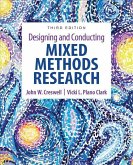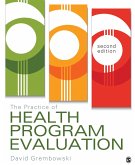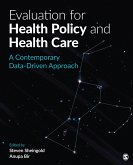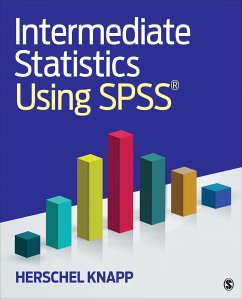- Broschiertes Buch
- Merkliste
- Auf die Merkliste
- Bewerten Bewerten
- Teilen
- Produkt teilen
- Produkterinnerung
- Produkterinnerung
Conducting Health Research: Principles, Process, and Methodsand consumers of health research. Through real-world examples and step-by-step guidance, Frederick J. Kviz provides students with the skills they need to: identify and evaluate research strengths and limitations as practitioners; to actually perform the various core aspects of research; and to choose among alternative methods when making decisions about health practice, policy, and future research needs.
Andere Kunden interessierten sich auch für
![Designing and Conducting Mixed Methods Research Designing and Conducting Mixed Methods Research]() John W. CreswellDesigning and Conducting Mixed Methods Research95,99 €
John W. CreswellDesigning and Conducting Mixed Methods Research95,99 €![Researching Health Together Researching Health Together]() Researching Health Together170,99 €
Researching Health Together170,99 €![The Practice of Health Program Evaluation The Practice of Health Program Evaluation]() David E GrembowskiThe Practice of Health Program Evaluation170,99 €
David E GrembowskiThe Practice of Health Program Evaluation170,99 €![Evidence-Based Public Health Practice Evidence-Based Public Health Practice]() Arlene G FinkEvidence-Based Public Health Practice115,99 €
Arlene G FinkEvidence-Based Public Health Practice115,99 €![Collaborative Approaches to Evaluation Collaborative Approaches to Evaluation]() Collaborative Approaches to Evaluation51,99 €
Collaborative Approaches to Evaluation51,99 €![Evaluation for Health Policy and Health Care Evaluation for Health Policy and Health Care]() Evaluation for Health Policy and Health Care199,99 €
Evaluation for Health Policy and Health Care199,99 €![Intermediate Statistics Using SPSS Intermediate Statistics Using SPSS]() Herschel KnappIntermediate Statistics Using SPSS165,99 €
Herschel KnappIntermediate Statistics Using SPSS165,99 €-
-
-
Conducting Health Research: Principles, Process, and Methodsand consumers of health research. Through real-world examples and step-by-step guidance, Frederick J. Kviz provides students with the skills they need to: identify and evaluate research strengths and limitations as practitioners; to actually perform the various core aspects of research; and to choose among alternative methods when making decisions about health practice, policy, and future research needs.
Hinweis: Dieser Artikel kann nur an eine deutsche Lieferadresse ausgeliefert werden.
Hinweis: Dieser Artikel kann nur an eine deutsche Lieferadresse ausgeliefert werden.
Produktdetails
- Produktdetails
- Verlag: Sage Publications
- Seitenzahl: 496
- Erscheinungstermin: 1. April 2019
- Englisch
- Abmessung: 254mm x 198mm x 28mm
- Gewicht: 998g
- ISBN-13: 9781483317588
- ISBN-10: 1483317587
- Artikelnr.: 54310345
- Herstellerkennzeichnung
- Produktsicherheitsverantwortliche/r
- Europaallee 1
- 36244 Bad Hersfeld
- gpsr@libri.de
- Verlag: Sage Publications
- Seitenzahl: 496
- Erscheinungstermin: 1. April 2019
- Englisch
- Abmessung: 254mm x 198mm x 28mm
- Gewicht: 998g
- ISBN-13: 9781483317588
- ISBN-10: 1483317587
- Artikelnr.: 54310345
- Herstellerkennzeichnung
- Produktsicherheitsverantwortliche/r
- Europaallee 1
- 36244 Bad Hersfeld
- gpsr@libri.de
Frederick J. Kviz, PhD, is Professor Emeritus, Community Health Sciences, at the University of Illinois at Chicago School of Public Health. He completed his BA, MA, and PhD degrees in sociology at the University of Illinois at Chicago. In addition to Conducting Health Research: Principles, Process, and Methods, He authored (with Kathleen A. Knafl) Statistics for Nurses: An Introductory Text, which received an American Journal of Nursing Book of the Year Award. He has authored and co-authored 55 peer-reviewed publications, as well as many monographs, technical reports, and professional meeting presentations. Dr. Kviz has developed and taught a variety of courses and workshops on research methods and statistics for undergraduate and graduate health sciences students, and for academic and practicing health professionals. His teaching has been recognized by awards for excellence based on peer reviews and student recognition. Also, he was inducted as a faculty member in the Lambda Chapter of the Delta Omega Honor Society (the public health honor society). He is a former Project Coordinator and Assistant Director of the University of Illinois Survey Research Laboratory, and is an expert in survey research methods, research design, and measurement. He has served as a consultant to many public and private health-related agencies, including community-based organizations, health maintenance organizations, city and county health departments, and major medical centers. Dr. Kviz's research has focused on the influence of psychosocial and sociocultural factors on health promotion and illness prevention attitudes and behaviors, and health disparities. His research has involved employing most of the methods described in Conducting Health Research: Principles, Process, and Methods.
Preface Companion Website About the Author Chapter 1
The Nature and Process of Research Learning Objectives Overview The Nature of Research The Research Process Key Points Review and Apply Study Further Chapter 2
Conducting Ethically Responsible Research Learning Objectives Overview Ethical Principles of Research With Human Subjects Federal Regulations Privacy Protection Key Points Review and Apply Study Further Chapter 3
Variables and Relationships Learning Objectives Overview Types of Variables Attributes of Relationships Causal Concepts Key Points Review and Apply Study Further Chapter 4
Research Design Diagrams and Components Learning Objectives Overview Research Design Diagrams Research Design Components Key Points Review and Apply Study Further Chapter 5
Research Design Validity Learning Objectives Overview Observational Designs Causal Designs Internal Validity Threats and Strategies External Validity Threats and Strategies Balancing Internal and External Validity Key Points Review and Apply Study Further Chapter 6
Research Designs Learning Objectives Overview Observational Designs Causal Designs Key Points Review and Apply Study Further Chapter 7
Random Sampling and Assignment Learning Objectives Overview Random Sampling Random Assignment Key Points Review and Apply Study Further Chapter 8
The Measurement Process Learning Objectives Overview From Concepts to Data Levels of Measuremen Measurement Theory Assessing Measurement Reliability Assessing Measurement Validity Item Response Theory Key Points Review and Apply Study Further Chapter 9
Developing a Measurement Instrument Learning Objectives Overview The Instrument Development Process Using Existing Instruments Developing a Rating Scale Key Points Review and Apply Study Further Chapter 10
Developing a Structured Questionnaire Learning Objectives Overview Key Concepts Questionnaire Development Process Questionnaire Design and Data Collection Mode Questionnaire Format Questionnaire Structure Key Points Review and Apply Study Further Chapter 11
Writing Survey Questions Learning Objectives Overview Types of Questions Question Wording Question Structure Response Choices Key Points Review and Apply Study Further Chapter 12
Survey Research Methods Learning Objectives Overview Basic Concepts Data Collection Modes Conducting a Survey Interviewing Key Points Review and Apply Study Further Chapter 13
Qualitative Research Methods Learning Objectives Overview Basic Concepts Qualitative Interview Methods Observation Methods Sampling Mixed Methods Key Points Review and Apply Study Further Chapter 14
Secondary Analysis and Existing Data Learning Objectives Overview Basic Concepts The Secondary Data Analysis Process Advantages, Limitations, and Ethics Secondary Data Sources Synthesizing Results From Multiple Studies Key Points Review and Apply Study Further Chapter 15
The Analysis Process and Reporting Results Learning Objectives Overview The Data Analysis Process Overview of Quantitative Data Analysis Overview of Qualitative Data Analysis Reporting Research Results Key Points Review and Apply Study Further Glossary References Index
The Nature and Process of Research Learning Objectives Overview The Nature of Research The Research Process Key Points Review and Apply Study Further Chapter 2
Conducting Ethically Responsible Research Learning Objectives Overview Ethical Principles of Research With Human Subjects Federal Regulations Privacy Protection Key Points Review and Apply Study Further Chapter 3
Variables and Relationships Learning Objectives Overview Types of Variables Attributes of Relationships Causal Concepts Key Points Review and Apply Study Further Chapter 4
Research Design Diagrams and Components Learning Objectives Overview Research Design Diagrams Research Design Components Key Points Review and Apply Study Further Chapter 5
Research Design Validity Learning Objectives Overview Observational Designs Causal Designs Internal Validity Threats and Strategies External Validity Threats and Strategies Balancing Internal and External Validity Key Points Review and Apply Study Further Chapter 6
Research Designs Learning Objectives Overview Observational Designs Causal Designs Key Points Review and Apply Study Further Chapter 7
Random Sampling and Assignment Learning Objectives Overview Random Sampling Random Assignment Key Points Review and Apply Study Further Chapter 8
The Measurement Process Learning Objectives Overview From Concepts to Data Levels of Measuremen Measurement Theory Assessing Measurement Reliability Assessing Measurement Validity Item Response Theory Key Points Review and Apply Study Further Chapter 9
Developing a Measurement Instrument Learning Objectives Overview The Instrument Development Process Using Existing Instruments Developing a Rating Scale Key Points Review and Apply Study Further Chapter 10
Developing a Structured Questionnaire Learning Objectives Overview Key Concepts Questionnaire Development Process Questionnaire Design and Data Collection Mode Questionnaire Format Questionnaire Structure Key Points Review and Apply Study Further Chapter 11
Writing Survey Questions Learning Objectives Overview Types of Questions Question Wording Question Structure Response Choices Key Points Review and Apply Study Further Chapter 12
Survey Research Methods Learning Objectives Overview Basic Concepts Data Collection Modes Conducting a Survey Interviewing Key Points Review and Apply Study Further Chapter 13
Qualitative Research Methods Learning Objectives Overview Basic Concepts Qualitative Interview Methods Observation Methods Sampling Mixed Methods Key Points Review and Apply Study Further Chapter 14
Secondary Analysis and Existing Data Learning Objectives Overview Basic Concepts The Secondary Data Analysis Process Advantages, Limitations, and Ethics Secondary Data Sources Synthesizing Results From Multiple Studies Key Points Review and Apply Study Further Chapter 15
The Analysis Process and Reporting Results Learning Objectives Overview The Data Analysis Process Overview of Quantitative Data Analysis Overview of Qualitative Data Analysis Reporting Research Results Key Points Review and Apply Study Further Glossary References Index
Preface Companion Website About the Author Chapter 1
The Nature and Process of Research Learning Objectives Overview The Nature of Research The Research Process Key Points Review and Apply Study Further Chapter 2
Conducting Ethically Responsible Research Learning Objectives Overview Ethical Principles of Research With Human Subjects Federal Regulations Privacy Protection Key Points Review and Apply Study Further Chapter 3
Variables and Relationships Learning Objectives Overview Types of Variables Attributes of Relationships Causal Concepts Key Points Review and Apply Study Further Chapter 4
Research Design Diagrams and Components Learning Objectives Overview Research Design Diagrams Research Design Components Key Points Review and Apply Study Further Chapter 5
Research Design Validity Learning Objectives Overview Observational Designs Causal Designs Internal Validity Threats and Strategies External Validity Threats and Strategies Balancing Internal and External Validity Key Points Review and Apply Study Further Chapter 6
Research Designs Learning Objectives Overview Observational Designs Causal Designs Key Points Review and Apply Study Further Chapter 7
Random Sampling and Assignment Learning Objectives Overview Random Sampling Random Assignment Key Points Review and Apply Study Further Chapter 8
The Measurement Process Learning Objectives Overview From Concepts to Data Levels of Measuremen Measurement Theory Assessing Measurement Reliability Assessing Measurement Validity Item Response Theory Key Points Review and Apply Study Further Chapter 9
Developing a Measurement Instrument Learning Objectives Overview The Instrument Development Process Using Existing Instruments Developing a Rating Scale Key Points Review and Apply Study Further Chapter 10
Developing a Structured Questionnaire Learning Objectives Overview Key Concepts Questionnaire Development Process Questionnaire Design and Data Collection Mode Questionnaire Format Questionnaire Structure Key Points Review and Apply Study Further Chapter 11
Writing Survey Questions Learning Objectives Overview Types of Questions Question Wording Question Structure Response Choices Key Points Review and Apply Study Further Chapter 12
Survey Research Methods Learning Objectives Overview Basic Concepts Data Collection Modes Conducting a Survey Interviewing Key Points Review and Apply Study Further Chapter 13
Qualitative Research Methods Learning Objectives Overview Basic Concepts Qualitative Interview Methods Observation Methods Sampling Mixed Methods Key Points Review and Apply Study Further Chapter 14
Secondary Analysis and Existing Data Learning Objectives Overview Basic Concepts The Secondary Data Analysis Process Advantages, Limitations, and Ethics Secondary Data Sources Synthesizing Results From Multiple Studies Key Points Review and Apply Study Further Chapter 15
The Analysis Process and Reporting Results Learning Objectives Overview The Data Analysis Process Overview of Quantitative Data Analysis Overview of Qualitative Data Analysis Reporting Research Results Key Points Review and Apply Study Further Glossary References Index
The Nature and Process of Research Learning Objectives Overview The Nature of Research The Research Process Key Points Review and Apply Study Further Chapter 2
Conducting Ethically Responsible Research Learning Objectives Overview Ethical Principles of Research With Human Subjects Federal Regulations Privacy Protection Key Points Review and Apply Study Further Chapter 3
Variables and Relationships Learning Objectives Overview Types of Variables Attributes of Relationships Causal Concepts Key Points Review and Apply Study Further Chapter 4
Research Design Diagrams and Components Learning Objectives Overview Research Design Diagrams Research Design Components Key Points Review and Apply Study Further Chapter 5
Research Design Validity Learning Objectives Overview Observational Designs Causal Designs Internal Validity Threats and Strategies External Validity Threats and Strategies Balancing Internal and External Validity Key Points Review and Apply Study Further Chapter 6
Research Designs Learning Objectives Overview Observational Designs Causal Designs Key Points Review and Apply Study Further Chapter 7
Random Sampling and Assignment Learning Objectives Overview Random Sampling Random Assignment Key Points Review and Apply Study Further Chapter 8
The Measurement Process Learning Objectives Overview From Concepts to Data Levels of Measuremen Measurement Theory Assessing Measurement Reliability Assessing Measurement Validity Item Response Theory Key Points Review and Apply Study Further Chapter 9
Developing a Measurement Instrument Learning Objectives Overview The Instrument Development Process Using Existing Instruments Developing a Rating Scale Key Points Review and Apply Study Further Chapter 10
Developing a Structured Questionnaire Learning Objectives Overview Key Concepts Questionnaire Development Process Questionnaire Design and Data Collection Mode Questionnaire Format Questionnaire Structure Key Points Review and Apply Study Further Chapter 11
Writing Survey Questions Learning Objectives Overview Types of Questions Question Wording Question Structure Response Choices Key Points Review and Apply Study Further Chapter 12
Survey Research Methods Learning Objectives Overview Basic Concepts Data Collection Modes Conducting a Survey Interviewing Key Points Review and Apply Study Further Chapter 13
Qualitative Research Methods Learning Objectives Overview Basic Concepts Qualitative Interview Methods Observation Methods Sampling Mixed Methods Key Points Review and Apply Study Further Chapter 14
Secondary Analysis and Existing Data Learning Objectives Overview Basic Concepts The Secondary Data Analysis Process Advantages, Limitations, and Ethics Secondary Data Sources Synthesizing Results From Multiple Studies Key Points Review and Apply Study Further Chapter 15
The Analysis Process and Reporting Results Learning Objectives Overview The Data Analysis Process Overview of Quantitative Data Analysis Overview of Qualitative Data Analysis Reporting Research Results Key Points Review and Apply Study Further Glossary References Index








